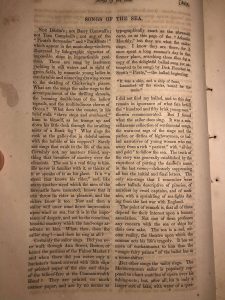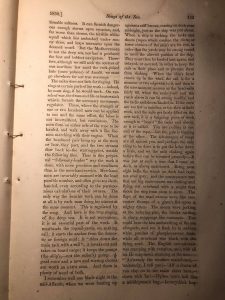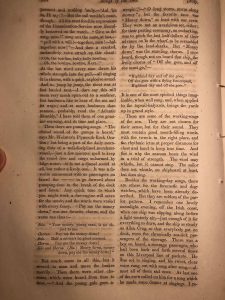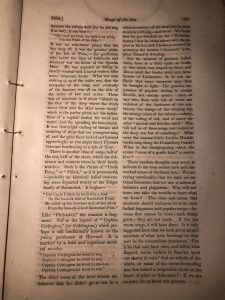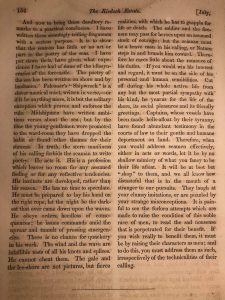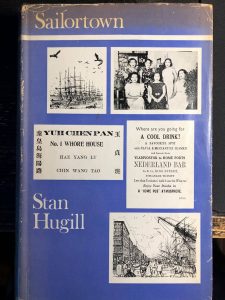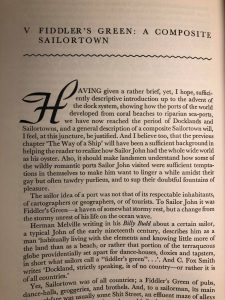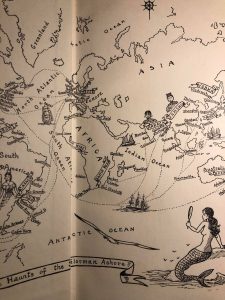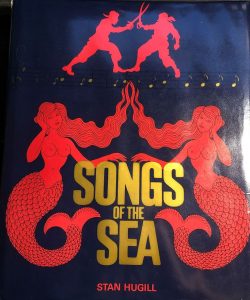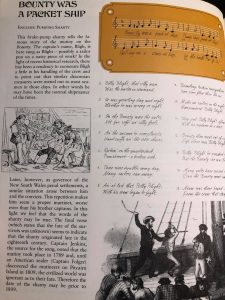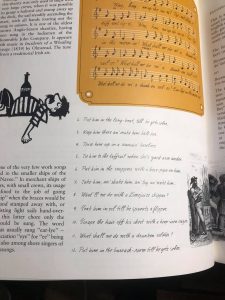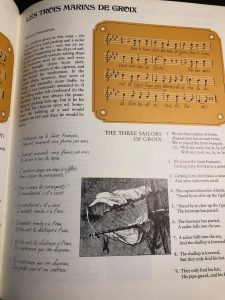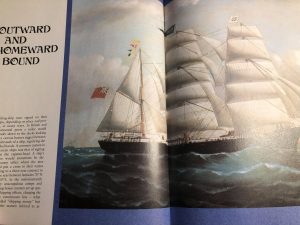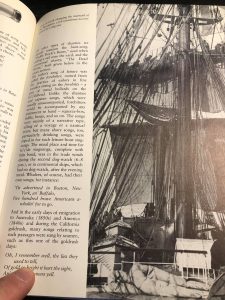The Atlantic Monthly – July (1858) “Songs Of The Sea”
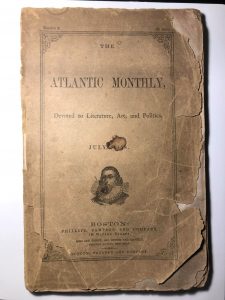
The Atlantic Monthly cover
Many times, I do observe Internet discussions …
… and disputes about Songs of the Sea. I also hear the word “Shanties” (the case of The Atlantic Monthly). It has so many meanings that it is not known if it still means anything at all. I also watch these discussions, I have often recklessly made judgments about what is and what is not shanties. I was not always right in these disputes, often wrong; but in the tangle of different opinions, preferences, or effects on the interlocutors, very quickly. Usually, a substantively promising discussion turns into a big argument without any topic.
However, Internet debates have always been more or less stormy. Perhaps I do not have a strong will or erudition and often get irritated unnecessarily. With this article (or rather a series of articles), I would like to show you a bit of what I do on a daily basis on the subject of “Shanties”. It will be the Story of a Single Source. As in the Atlantic Monthly Magazine; the title “Songs of the Sea” (it is the title page of Number 9 of July 1858). From this type of source; I try to learn about shanties and the songs that accompanied sailors during the golden age of sails. In this post I will post an article; I hope many of you will touch a little bit on this beautiful and true story about the Sailors and their songs.
First of all, before I will start presenting The Atlantic Monthly …
… sharing the text, let me tell you a few words about how I came into possession of this article; so, first, I learned about the article from the book by Gibb Schreffler – “Boxing the Compas”. Whenever I read books about shanties; an important point is to meticulously write down the source texts given by the authors; this time it was no different. The article was placed in the first position; at the end of the first chapter of the book, as the oldest source given by the author. The next thing I do is save it to a text file on the list of sources to get; and of course. I will never forget to paste it into a web browser; and then in a few online bookstores if it is possible, somewhere, to get a physical copy of the source.
This time I was lucky and on one of the sales portals I managed to buy 2 issues of this magazine; one from 1870; and another with the article from 1858, you could buy both copies only together; so I did it, cost £ 44.57. Immediately after opening, when I took the first page (cover); I spread it about 2 cm in length; it turned out that the pages are really delicate and prone to damage; so I immediately took pictures so that the photos could be easily translated.
In the next part, I will post the first part of the actual article; the Film presents the condition of the magazine with the text. This is the first article of this type that I post on my Fan Page; but I trying for almost a year to share my knowledge about shanties, on the Facebook group; to which I invite you, here the Fan Page.
Here is the article in The Atlantic Monthly – “Songs Of The Sea”:
“Not; Dibdin’s; not. Barry Cornwall’s; not Tom Campbell’s; not any of the “Pirate’s Serenades” and “I’m afloats!” which appear in the music shop windows, illustrated by lithographic vignettes of impossible ships in. These are sung by landsmen yachting in still waters and in sight of green fields, by romantic young ladies in comfortable and unmoving drawing-rooms to the tinkling of Chickering’s pianos. What are the songs the sailor sings to the accompaniment of the thrilling shrouds, the booming double-bass of the hollow topsails, and the multitudinous chorus of Ocean? Whaat does the coaster, in his brief walk “three steps and overboard, hum to himself, as he tramps up and down his little deck through the swathing mists of a Bank fog?
Whatt sings the cook at the galley-fire in doleful unison with the bubble of his coppers? Surely not songs that exult in the life of the sea. Certainly not, my amateur friend, anything that breathes of mastery over the elements. The sea is a real thing to him. He never is familiar with it, or thinks of it or speaks of it as his slave. It is “a steed that knows his ridder,” and, like many another steed which the men of the forecastle have mounted, knows that it can throw its rider at pleasure, and the riders know it too. Now and then a sailor will utter some fierce imprecation upon wind or sea, but it is in the impotence of despair, and not in the conscious, boastful mastery which the land-songs attribute to him. What, then, does the sailor sing? –and does he sing at all?
Certainly, the sailor sings. Did you ever walk through Ann Street, Boston, or haunt the purlieus of the Fulton Market? and when there did you never espy a huckster’s board covered with little slips of printed paper of the size and shape of the bills-of-fare at the Commonwealth Hotel? They are printed on much coarser paper, and are by no means as typographically exact as the aforesaid ‘carte’, or as this page of the “Atlantic Monthly”, but they are what the sailor sings. I know they are there, for I once spent a long summer’s day in the formenr place, searching those files for a copy of the delightfull ballad sung (or attempted to be sung) by Dick Fletcher in Scott’s “Pirate,”–the ballad beginning:
“It was a ship, and ship of fame,
Launched off the stocks, bound for the main.”
I did not find my ballad, and to this day remain in ignorance of what fate befell the “hundred and fifty brisk young men” therein commemorated. But I found what the sailor does sing. It was a moscellaneous collection of sentimental songs, the worn-out rags of the stage and the parlor, or ditties of highwaymen, or ballad narratives of young women who ran away from a rich “parient” with “silver and gold” to follow the sea. The truth of the story was generally established by the expedient of putting the damsel’s name in the last verse,–delicately suppressing all but the initial and final letters. The only sea-songs that I remember were other ballads descriptive of pirates, and of mutinies, with a sprinklingof sea-fights dating from the last war with England.
The point of remark is, that all of these depend for their interest upon a human association. Not one of them professes any concern with the sea or ships for their own sake. The sea is a sad, solemn reality, the theatre upon which the seamen acts his life’s tragedy. It has no more of enchantment to him than the “magic fairy place” of the ballet has to a scene-shifter.
But other songs the sailor sings.The Mediterranean sailor is popularly supposed to chant snatches of opera over his fishing-nets; but, after all, his is only a larger sort of lake, with water of a questionable saltness. It can furnish dangerous enough storms upon occasion, and, far worse than storms, the terrible white-squall which lies ambushed under sunny skies, and leaps unawares upon the doomed vessel. But the Mediterranean is not the deep sea, nor has it produced the best and boldest navigators. Therefore, although we still seek the sources of our maritime law amid the rock-poised huts (once palaces) of Amalfi, we must go elsewhere for our true sea-songs.
I remember well one black night in the mid-Atlantic, when we were beating up against a stiff breeze, coming on deck near midnight, just as the ship was put about. When a ship is tacking, the tacks and sheets (ropes which confine the clews or lower corners of the sails) are let run, in order that they yards may be swung round to meet the altered position of the ship.
They must then be hauled taut again, and belayed, or secured, in order to keep the sails in their place and to prevent them from shaking. When the ship’s head comes up in the wind, the sail is for a moment or two edgewise to it, and then is nice moment, as soon as the head-sails fairly fill, when the main-yard and the yards above it can be swung readily, and the tacks and sheets hauled in. If the crew are too few in number, or too slow at their work, and the sails get fairly filled on the new tack, it is a fatiguing piece of work enough to “board” the tacks and sheets, as it is called.
You are pulling at one end of the rope,–but the gale is tugging at the other. The advantages of lungs are all against you, and perhaps the only thing to be done is to put the helm down a little, and set the sails shaking again before they can be trimmed properly.–It was just at such a time that I came on deck, as above mentioned.
Being near eight bells, the watch on deck had been not over spry; and the consequence was that our big main-course was slatting and flying out overhead with might that shook the ship from stem to stern. The flaps of the mad canvas were like successive thumps of a giant’s fist upon a mighty drum. There sheets were jerking at the belaying-pins, the blocks rattling in sharp snappings like castanets.
You could hear the hiss and seething of the sea alongside, and see it flash by in sudden white patches of phosphorescent foam, while all overhead was black with the flying scud.
The English second-mate was stamping with vexation, and, with all his Hs misplaced, storming at the men:–“‘An’somely, I tell you!–‘Alf a dozen of you clap on to the main sheet here,–down with ‘im!–D’y’see ‘ere’s hall like a midshipsman’s bag,–heverythink huppermost and noting ‘andy.–‘Aul ‘im in, Hi say!”–But the sail wouldn’t come, though. All the most forcible expressions of the Commination-Service were liberally bestowed on the watch. “Give us the song, men!” sang out the mate, at last–“pull with a will!–together, men!–haltogether now!”–And then a cracked, melancholy voice struck up this chant:
“Oh, the bowline, bully bully bowline,
Oh, the bowline, bowline, HAUL!”
At the last word every man threw his whole strength int the pull,–all singing it in chorus, with a quick, explosive sound. And so, jump by jump, the sheet was at last hauled taut.–I dare say this will seem very much spun out to a seafarer, but landsmen like to hear of the sea and its ways; and as more landsmen than seamen, probably, read the “Atlantic Monthly,” I have told them of one genuine sea-song, and its time and place.
Then there are pumping-songs. “The dismal sound of the pumps is heard,” says Mr. Webster’s Plymouth-Rock Oration; but being a part of the daily morning duty of a well-disciplined merchant-vessel,–just a few minutes’ spell to keep the vessel free and cargo unharmed by bilge-water,–it is not a dismal sound at all, but rather a lively one. It was a favorite amusement with us passengers on board the —— to go forward about pumping-time to the break of the deck and listen. Any quick tune to which you might work a fire-engine will serve for the music, and the words were varied with every fancy, “Pay me the money down,” was one favorite chorus, and the verse tan thus:–
Solo. “Your money, young man, is no object to me.
Chorus. Pay me the money down!
Solo. Half a crown’s no great amount.
Chorus. Pay me the money down!
Solo and Chorus. (Bis.) Money down, Money down, pay me the money down!”
Not much sense in all this, but it served to man and move the brakes merrily. Then there were other choruses, which were heard from time to time,–“And the young gals goes aweepin’,”–“O long storm, storm along stormy”; but the favorite tune was “Money down,” at least with our crew. They were not an avaricious set, either; for their parting ceremony; on embarking; was to pitch the last half-dollars of their advance on to the wharf, to be scrambled for by the land-sharks. But “Money down” was the standing chorus. I once heard, though not on board that ship, the lively chorus of “Off she goes, and off she must go,”–
ff she goes with a flying fore-topsail,
Highland day and off she goes.”
t is one of the most spirited things imaginable, when well sung; and, when applied to the topsail-halyards, brings the yards up in grand style.
They must contain good mouth-filling words, with the vowels in the right place, and the rhythmic ictus at proper distances for chest and hand to keep true time. And this is why the seaman beats the wind in a trial of strength. The wind may whistle, but it cannot sing. The sailor does not whistle, on shipboard at least, but does sing.
Besides the working-day songs, there are others for the forecastle and dogwatches, which have been already described. But they are seldom of the parlor pattern. I remember one lovely moonlight evening, off the Irish coast, when our ship was slipping along before a light westerly air,–just enough of it for everything to draw, and the ship as steady as Ailsa Crag, so that everybody got on deck, even the chronically sea-sick passengers of the steerage.
There was a boy on board, a steerage passenger; who had been back and forth several times on this Liverpool line of packets. He was set to singing, and his sweet, clear voice rang out with song after song,–almost all of them sad ones. At last one of the crew called on him for a song which he made some demur at singing. I remember the refrain well (for he ‘did’ sing it at last); it ran thus:–
“My crew are tried, my bark’s my pride,
I’m the Pirate of the Isles.”
It was no rose-water piracy that the boy sang of; it was genuine pirate of the Isle of Pines,–the gentleman eho before the terror of the Spanish Main. He was depicted as falling in deadly combat with a naval cruiser, after many desperate deeds. What was most striking to us of the cabin was, that the sympathy of the song, and evidently of the hearers; was all on the side of the defier of law and order. There was no nonsense in it about “islands on the face of the deep where the winds never blow and the skies never weep,” which to the parlor pirate are the indications of a capital station for wood and water, and for spending his honeymoon.
It was downright cutting of throats and scuttling of ships that our youngster sang of, and the grim faces looked and listened approvingly, as you might fancy Ulysses’s veterans hearkening to a tale of Troy.”…
There is another class of songs, half of the sea, half of the shore, which the fishermen and coasters croon in their lonely watches. Such is the rhyme of “Uncle Pelag;” or “Pillick,” as it is pronounced,–probably an historical ballad concerning some departed worthy of the Folger family of Nantucket. It begins–
“Old Uncle Pillick he build him a boat
On the ba-a-ck side of Nantucket P’int;
He rolled up his trowsers and set her afloat
From the ba-a-ck side of Nantucket P’int.”
Ike “Christabel,” this remains a fragment. Not so the legend of “Captain Cottington,” (or Coddington,) which perhaps is still traditionally known to the young gentleman at Harvard. It is marked by a bold and ingenious metrical novelty.
“Captaain Cottington he went to sea,
Captain Cottington he went to sea,
Captain. Cottington he went to sea-e-e,
Captain Cottington he went to sea.”
The third verse of the next stanza announces that he didn’t go to sea in a schoo-oo-ooner,–of the next that he went to sea in a bri-i-ig,–and so on. We learn that he got wrecked on the “Ba-ha-ha-hamys,” that he swam ashore with the papers in his hat, and, I believe; entered his protest at the nearest “Counsel’s” (Anglice, Consul’s) dwelling.
For the amateur of genuine ballad verse, here is a field quite as fertile as that which was reaped by Scott and Ritson amid the border peels and farmhouses of Liddesdale. It is not unlikely that some treasures may thus be brought to light. The genuine expression of popular feeling is always forcible, not seldom poetic. And at any rate, these wild bits of verse are redolent of the freshness of the sea-breeze, the damps of the clinging fog, the strange odors of the caboose-cookery, of the curing of cod; and of many another “ancient and fish-like smell.” Who will tell us of these songs, not indeed of the deep sea; but of soundings? What were the stanzas which Luckie Muckle-backit sang along the Portanferry Sands? What is the dreding-song which the oyster “come of a gentle kind” is said to love?
ore. We are crying continually, that we have national literature, that we are a nation of imitators and plagiarists. Why will not someone take the trouble to learn what we have? This does not mean that amateurs should endeavor to write such ballad fragments and popular songs,–because that cannot be done; such things grow,–they are not made. If the sea wants songs, it will have them. It is only suggested here that we look about us and ascertain of what lyric blessings we may now be the unconscious possessors. Can it be that oars have risen and fallen, sails flapped, waves broken in thunder upon our shores in vain? that no whistle of the winds, or moan of the storm-foreboding seas has waked a responsive chord in the heart of pilot or fisherman? If we are so poor, let us know our poverty.
And now to bring these desultory remarks to a practical conclusion. I have written these seemingly trifling fragments with a serious purpose.It is to show that the seaman has little or no art or part in the poetry of the seas. I have put down facts, have given what experience I have had of some of the idiosyncrasies of the forecastle. The poetry of the sea has been written on shore and by landsmen. Falconer’s “Shipwreck” is a clever nautical tract, written in verse,–or if it be anything more; it is but the solitary exception which proves and enforces the rule. Midshipmen have written ambitious verses about the sea;
but by the time the young gentelmen were promoted to the ward-room they have dropped the habit or found other themes for their stanzas. In truth, the stern manliness of his calling forbids the seaman to write poetry. He acts it. His is a profession which leaves no room for any assumed feeling or for any reflective tendencies. His instincts are developed, rather than his reason. He- has no time to speculate. Hee must be prepared to lay his hand on the right rope, let the night be the darkest that ever came down upon the waves. He obeys orders, heedless of consequences; he issues commands amid the uproar and tumult of pressing emergencies. There is no chance for quackery in his work. The wind and the wave are infallible tests of all his knots and splices.
He cannot cheat them. The gale and the lee-shore are not pictures; but fierce realities, with which he has to grapple for life or death. The solider and the fireman may pass for heroes upon an assumed stock of currage; but the seaman must be a brave man in his calling, or Nature steps in and brands him coward. Therefore he cares little about the romance of his duties. If you would win his interest and regard, it must be on the side of his personal and human sensibilities. Cut off during his whole active life from any but the most partial sympathy with his kind, he yearns for the life of the shore, its social pleasures and its friendly greetings.
Captains, whose vessels have been made hells-afloat by their tyranny, have found abundant testimony in the courts of law to their gentle and humane deportment on land. Therefore, when you would address seamen effectively, either in acts or words; let it be by no shallow mimicry of what you fancy to be their life afloat. It will be at best but “shop” to them, and we all know how distasteful that is in the mouth of a stranger to our pursuits.
They laugh at your clumsy imitations, or are puzzled by your strange misconceptions. It is painful to see the forlorn attempts which are made to raise the condition of this noble race of men; to read the sad nonsense that is preparated for their benefit. If you wish really to benefit them, it must be by raising their characters as men; and to do this, you must address them as such, irrespectivelly of the technicalities of their calling.
Do you want to be more involved?
You can find excellent records of sea shanties here. If you want to discuss this book or share your opinion you can do it in my Facebook forum here, or below post in the comment section.
Related to Stan Hugill – Shanties and Sailors’ Songs
Additional Stan Hugill’s books:
Shanties and Sailor’ Songs (1969)
Sea Shanties (1977)
Songs Of The Sea (1977)





